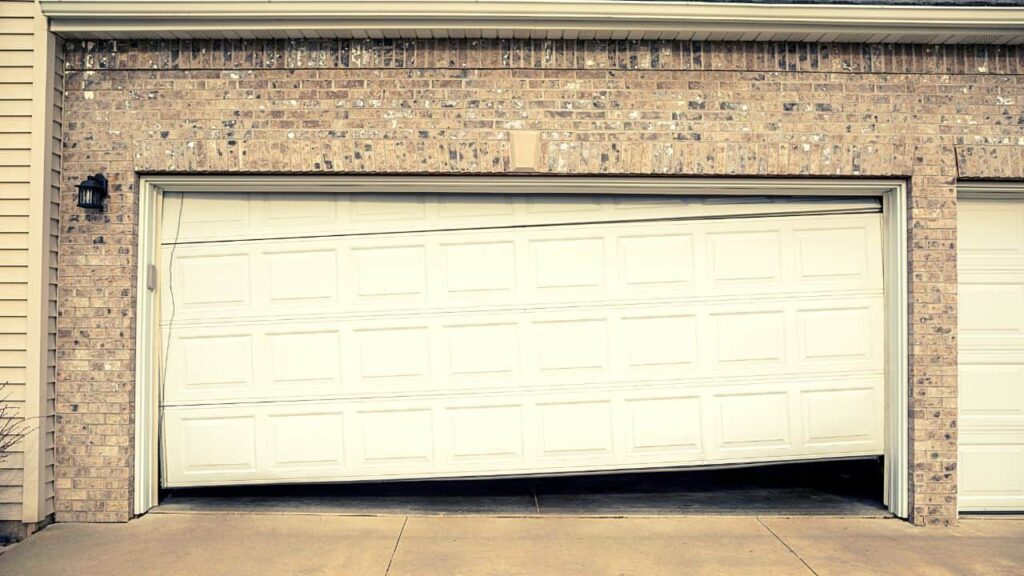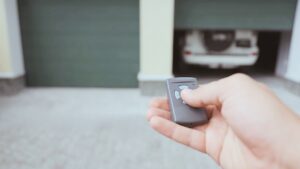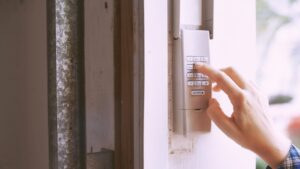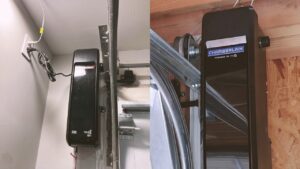If you own a garage, it’s inevitable to face garage door problems. Sadly, we also understand how hard it can be to deal with those problems, especially if it’s your first time.
But don’t worry. We’re here to help!
Your garage door isn’t only a gateway to parking your car, and it’s also where most people store some of their belongings and a path into your house.
As a result, it’s essential to safeguard your home and family against garage door problems. This is because these issues can lead to many dangers if left unresolved.
Let’s say an unbalanced garage door comes crashing down unexpectedly, leading to severe injury or property damage. Now that’s something you don’t want to experience.
Fortunately, this guide outlines the ten most common garage door problems and how to troubleshoot them.
Ready to learn more? Let’s get started.
1. The Garage Door Won’t Open or Close Completely
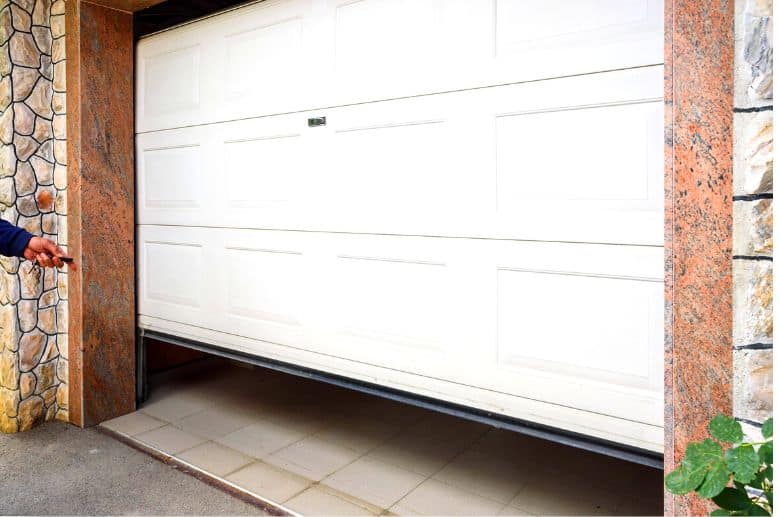
Garage door troubles can vary from insignificant irritations to major difficulties. One frequent issue is when the garage door fails to open or close entirely, possibly due to numerous causes.
Therefore, it’s important to understand what’s ailing your garage door before attempting any fixes.
Possible Causes
If your garage door doesn’t open or close properly, it could be due to the following:
- Obstructions in the track: The track connects your garage door to the frame, allowing you to open or close the door seamlessly. If it has any obstructions, the tract won’t work accordingly.
- Disconnected or broken springs: Garage door springs ensure the door opens and closes seamlessly using the appropriate force. If the springs wear out, break, or disconnect from the door, it might be hard to open and close it.
- Corroded hinges: The thickness of rust can cause your garage door hinges to jam and not work properly, which can cause opening and closing issues.
- Faulty motor: If the wiring is short, the motor may not run at full capacity, meaning it will struggle to open or close your door. Additionally, if your motor experiences damage due to wear and tear, it may not be able to provide enough power to open or close the door.
Solutions to Fix the Problem
Let’s assume you’re experiencing the same problems we’ve listed above. How do you fix them?
Here’s how:
- Clean and lubricate your garage door track: Ensure you remove any debris or dirt from the track that connects the door to its frame. Next, add some lubrication to the tracks to ensure they run smoothly.
- Replace damaged springs: It’s important to consult a professional to help replace damaged springs, according to the garage door manufacturer.
- Replace rusty hinges: Replace any corroded hinges immediately, as rust can eat up the hinges leading to wear and tear.
- Check the opener: Again, consult a professional to help determine whether your opener needs replacement or repair.
Connect With A Garage Expert
Connect with local experts, Compare quotes, Get the best price.
2. Door Opens or Closes Unexpectedly
Have you ever experienced your garage door opening or closing unexpectedly? Well, it happens, and the following might be the possible reasons.
Possible Causes
If your garage door is opening or closing unexpectedly, it could be because of the following:
- Faulty wiring: Faulty wiring in your garage door can cause it to open or close unexpectedly, which can be an inconvenience and a hazard to your family and home.
- Faulty remote control: A malfunctioning remote control can also cause your door to open and close without your consent. This can be due to battery issues or a circuit problem in the remote.
- Disconnected or misaligned safety sensors: If the safety sensors of your garage door are disconnected, misaligned, or malfunctioning, this could cause the door to open or close unexpectedly.
Solutions to Fix the Problem
If you’re experiencing any of the above problems, you can try a few different solutions:
- Check the wiring: Inspect the wiring connecting the door to its opener for any signs of damage or disconnection. If you don’t feel comfortable doing this yourself, get a professional to check it out.
- Replace remote batteries: Replace the batteries of your garage door with new ones. If that doesn’t work, consider replacing the remote.
- Replace safety sensors: Replace any misaligned, disconnected, or damaged safety sensors. Ensure you consult a professional garage door technician for help.
With professional help, you can ensure your garage door doesn’t open or close without your awareness.
3. Loud Noises Coming from the Opener Unit
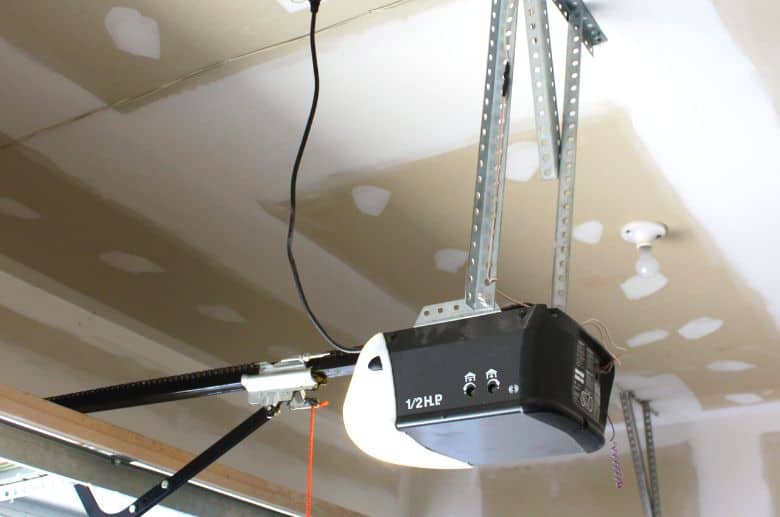
While minor sounds like a creaking door or humming motor are normal, a loud banging noise from your garage door could signify something more serious.
Possible Causes
If you’re hearing loud noises coming from your garage door opener, it could be because of the following:
- Misaligned chain or belt: If your garage door utilizes chains or belts to operate it, misalignment could be the culprit behind its loud noises when opening and closing.
- Loose parts: Any nuts, bolts, screws, or other components that have become loose could cause a banging noise when you open or close your garage door.
- Broken motor mount: If your garage door motor mount is broken or worn out, it can cause a loud banging noise when it opens and closes.
Solutions to Fix the Problem
Assuming you’re experiencing the problems we’ve described above, here are some solutions to the problems:
- Tighten all components: Check your garage door opener’s components and tighten any loose nuts, bolts, and screws.
- Realign chain/belt: With professional help, you can realign your garage door’s chain and belts to ensure they operate properly.
- Replace motor mount: Replace your motor mount if it has experienced any damage.
4. Opener Malfunction
Garage door openers are a vital part of any garage because they allow you to easily and conveniently access your garage.
But a motor malfunction can be common with garage door openers, leading to many problems. These problems may include unexpected openings or closings to loud noises from the opener unit.
Possible Causes
If you have a malfunctioning garage door opener, there are several possible causes:
- Power surge: Power surges involve more voltage coming through the garage door wiring. This can be too significant to handle for the opener, leading to a malfunction.
- Faulty wiring: Poorly wired components and connections can cause excessive voltage drop and current draw, leading to motor overload and eventual failure. Faulty wiring may also result in insufficient power being delivered to the opener, resulting in reduced operating speed or an inability to open the door.
- Broken carriage trolley: The carriage trolley connects the opener to your garage door. If the carriage trolley is loose or broken, it can cause a malfunction in the opening and closing mechanism.
Solutions to Fix the Problem
If your garage door opener is malfunctioning, there are a few solutions that you can try:
- Check the wiring: Carefully inspect your garage door opener and ensure it is secure and properly connected.
- Replace trolley: If the trolley is loose or broken, you will need to replace it with the help of a professional.
- Check power source: To avoid power surges, ensure the power source for your garage door opener is connected properly and not suffering from any power surges or electrical spikes.
5. Obstruction in the Tracks
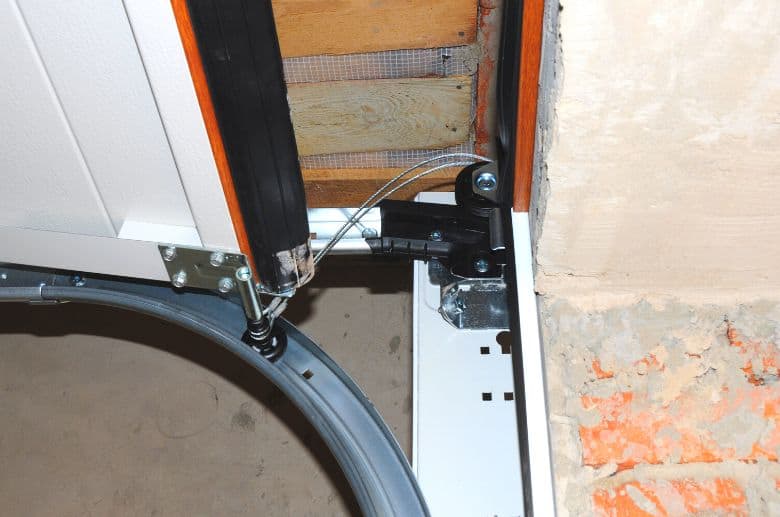
As mentioned earlier, your garage door’s opening and closing mechanism depends on the tracks that connect it to the frame. If these tracks are obstructed, they can’t serve their purpose accordingly.
Possible Causes
The following are some of the possible causes of obstructions in the tracks:
- Dirt and debris: The most common sources of dirt and debris include leaves, twigs, grass clippings, mud, snow, ice, dirt, sand, animal or insect droppings or nests, and other organic matter. These items can easily get inside your garage door tracks and limit their capabilities.
- Accidentally placed objects: Large objects, like chairs or bikes, can easily be placed in the tracks accidentally, creating an obstruction.
Solutions to Fix the Problem
If your garage door has an obstruction in the track, here are some potential solutions:
- Inspect and clean the tracks: Check every area around the tracks and use a broom or vacuum to remove any dirt and debris.
- Check for large objects: Ensure no large objects are blocking the tracks, and remove any obstructions carefully.
- Tighten loose screws and bolts: To ensure everything works accordingly, check and tighten any loose bolts or screws.
6. Misaligned or Bent Tracks
While obstructions are the main reasons your garage door tracks don’t work as expected, there are other causes too. When the garage door tracks bend or get misaligned, they won’t work properly.
Warning signs that indicate a need to check track rails’ alignment or curvature include difficulty opening and closing the door, loud grinding noises when moving, and jerky door movements.
Possible Causes
A few simple things can cause misaligned or bent tracks.
- Accidental damage: Accidentally hitting the track rails with heavy objects like moving furniture or backing into the garage door can misalign or bend them.
- Weather damage: High winds can cause physical damage to the garage door track as gusts of wind buffet it. Similarly, heavy rains can erode the metal, making it more prone to corrosion and weakening its structural integrity. Hail can cause dents in metal tracks or even crack the plastic components of some modern garage doors.
- Wear and tear: Wear and tear are when parts of the track rails get worn out over time due to normal use. When this happens, it can make it harder for the door to open and close properly and could even cause loud noises when moving.
Solutions to Fix the Problem
If your garage door’s track rails are misaligned or bent, here are some potential solutions:
- Check track alignment: Use a level or ruler to check if the tracks are aligned properly. If they are not, you may need to reposition them manually, but we suggest with the help of a professional.
- Check the curvature of tracks: Ensure the track rails are correctly shaped. If that’s not the case, you’ll need to replace them.
7. Broken or Damaged Springs
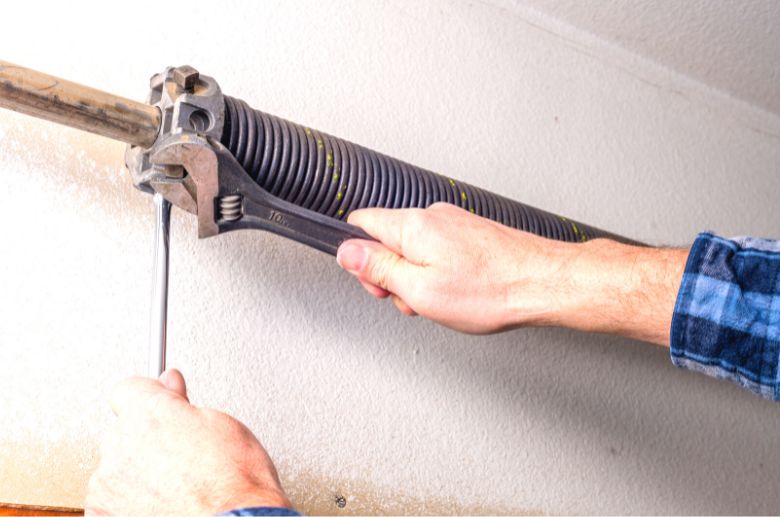
Needless to say, garage door springs serve a significant purpose when it comes to the door’s opening and closing mechanism. If they break or are damaged, your door won’t function properly.
But what could cause garage door springs to break?
Possible Causes
Here are some of the common causes of damage to your garage door springs:
- Spring life cycle: Garage door springs have life cycles ranging from 10,000 – 30,000 cycles. The springs may wear out and break or be damaged over time. If you’re experiencing damaged springs, it could be due to their reaching the end of their life cycle.
- Rust: Rust can weaken the springs through corrosion, making them more likely to break.
- Cold weather: When it is cold, the material of the springs can become stiff and brittle, causing them to crack or snap when put under pressure.
Solutions to Fix the Problem
So, how do you deal with the problem of broken or damaged garage door springs?
Here’s how:
- Replace the springs: Well, without new or proper working springs, you’re putting yourself and your family at risk. And the only way to fix broken or damaged springs is to replace them with new ones.
Connect With A Garage Expert
Connect with local experts, Compare quotes, Get the best price.
8. Faulty Wiring/Electrical Components
Issues with electrical wiring or components can occur when a wire is either disconnected or loose, and circuit boards may also fail or experience malfunctions.
The main signs of faulty wiring include loud buzzing sounds from the garage door opener and flickering or dim lights.
In some cases, the garage door may not open at all. If you’re having this issue with your garage door, it is best to call an experienced garage door technician for professional assistance.
Possible Causes
The possible causes of faulty wiring or electrical components include
- Damaged wires: Wires can experience damage due to corrosion, wear and tear, or accidental damage.
- Faulty circuit board: A circuit board may fail or malfunction due to age or a power surge.
- Loose connections: Your garage door wiring may loosen up due to wear and tear or vibration from the garage door opener.
Solutions to Fix the Problem
Suppose your garage door wiring or electrical components are experiencing some glitches. Here are some solutions for such problems:
- Check wiring and connections: Inspect the wires and connections to ensure they are connected properly. If there is a loose connection, you can try tightening it yourself with a wrench or seek professional assistance.
- Replace broken parts: If any parts of your garage door opener are broken or damaged, you may need to replace them. This is a job that should only be done by a professional.
9. Malfunctioning Components
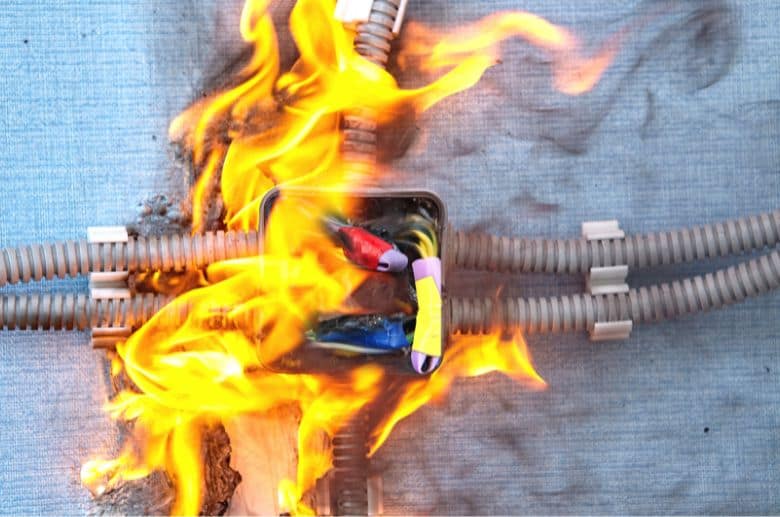
From worn-out springs, your garage door opening and closing unexpectedly to damage due to extreme weather conditions, your garage door may fail to work properly due to various malfunctioning components.
Possible Causes
The possible causes of malfunctioning components include:
- Worn-out or broken springs: Although a garage door spring is designed to last approximately seven years, environmental conditions and simple wear-and-tear can cause the springs to break prematurely.
- Faulty cables or tracks: The cables and tracks that connect the garage door to the opener can become damaged due to wear and tear, accidental damage, or rust.
- Faulty wiring/electrical components: Faulty wiring can occur when a wire is disconnected or loose or if a circuit board fails or malfunctions.
Solutions to Fix the Problem
The following are some solutions to combat malfunctioning components of your garage door:
- Replace broken parts: Don’t let your home’s security be compromised; replace any broken parts of your garage door before it’s too late! This is a job that should only be done by a professional.
- Clean and lubricate components: To ensure they function properly, you can clean and lubricate the springs, cables, and tracks.
10. Damage Due to Weather, Pests, or Age
Pests, extreme weather conditions, and the age of your garage door can also betray its ability to function properly. This can lead to the garage door not opening or closing properly and may pose a safety risk.
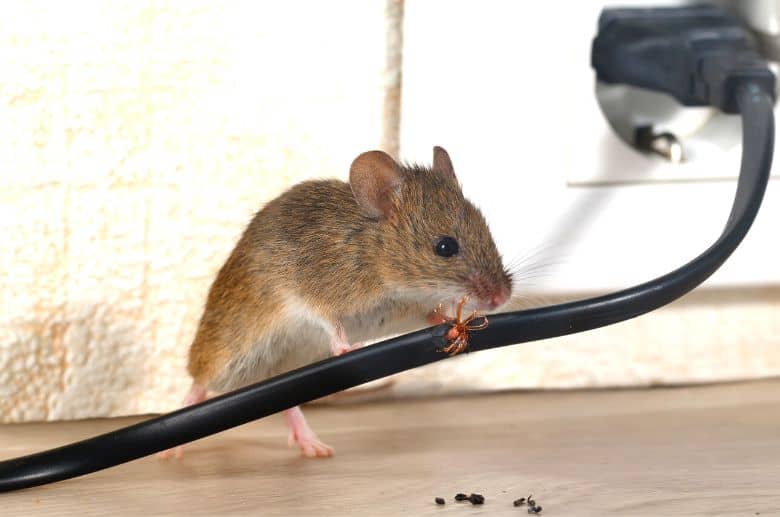
If you notice signs of damage, such as rust, dents, or cracks in your garage door, it is important to get it looked at immediately.
Possible Causes
Here are some possible causes of damage due to weather, pests, or age:
- Rust: Because of exposure to moisture over long periods, your garage door may experience corrosion, weakening its ability to operate properly.
- Pests: Animals such as mice and rats can cause damage to garage doors by chewing through the insulation or creating nests inside of it. This can damage the wiring of your garage door, causing it to jam.
- Age: The average life expectancy of a garage door is 20 to 25 years. But your garage door may weaken over time due to age and wear and tear. This can lead to cracks in the metal, dents, or other signs of damage.
Solutions to Fix the Problem
Fortunately, you can fight the problems above by employing the following:
- Replace Damaged Parts: Replace any part of your garage door that has experienced severe damage instead of repairing it.
- Consult a Professional: Seek professional help to determine whether some parts of your garage door require repair or complete replacement.
- Replace the Entire Door: This is another instance where you need professional assistance. A garage door technician will consider all the factors causing your garage door to not function properly and determine the best direction to take.
When to Seek Professional Assistance
While you may be able to do some of the repairs yourself, such as cleaning and lubricating garage door components, it is generally best to seek professional assistance.
A professional garage door repair technician from Garage Insider can determine the exact cause of the issue and provide you with the necessary repairs quickly and safely.
This can save you time and money and ensure that your garage door functions properly again in no time!
If you’re wondering when the best time to seek professional assistance for garage door problems is, the answer is now!
Don’t wait until it’s too late!
Connect With A Garage Expert
Connect with local experts, Compare quotes, Get the best price.
Final Words
Garage door problems can arise from various factors, as explained above. If you notice any damage, taking care of the problem immediately is essential!
Fortunately, we have experienced technicians here at Garage Insiders who can help diagnose garage door problems and quickly provide you with the necessary assistance.
Don’t wait; contact us today to get your garage door back up and running in no time!
FAQs
Here are the most common frequently asked questions about garage door problems:
What are the most common residential garage door problems?
The most common residential garage door problems are:
- Broken springs
- Worn-out rollers
- Snapped cables
- Broken tracks, and
- Incorrect settings.
If you are experiencing any of these issues, seeking professional help to ensure your garage door is functioning correctly is best.
What are the common causes of garage door sensor problems?
The most common causes of garage door sensor problems are
- Dirt or debris in the sensors or their wiring
- Misaligned sensors
- Damaged wiring or connectors
- Incorrectly adjusted sensitivity settings, and
- Improper installation.
If you suspect your problem is due to a faulty sensor, it is best to have it inspected by a professional to determine the root cause.
How would I troubleshoot my broken garage door?
The best way to troubleshoot your broken garage door is by performing a visual inspection.
- Start by examining the tracks, rollers, and springs for any signs of damage or wear. Pay close attention to any bent or damaged parts that may be causing your door to malfunction.
- Next, look at the sensors and wiring to ensure they are correctly connected and aligned.
- Lastly, ensure the force settings are accurate and the door opens and closes smoothly.
If you cannot resolve the issues, consulting a professional for assistance may be best.

